Welcome to Flash Pulp, episode one hundred and forty.

Tonight we present, Bearing, Part 1 of 1
[audio:http://traffic.libsyn.com/skinner/FlashPulp140.mp3]
Download MP3
(RSS / iTunes)
This week’s episodes are brought to you by the artistic variety of the Nutty Bites Podcast.
Find out more at http://nimlas.org/blog/
Flash Pulp is an experiment in broadcasting fresh pulp stories in the modern age – three to ten minutes of fiction brought to you Monday, Wednesday and Friday evenings.
Tonight, we enter the home of a family in transition – a family on the cusp of a life-altering move.
Flash Pulp 140 – Bearing, Part 1 of 1
Written by J.R.D. Skinner
Art and Narration by Opopanax
and Audio produced by Jessica May
Carlos was pulled into consciousness by the smell of cooking bacon, and the sound of Aretha Franklin. Both were drifting into the bedroom from the distant kitchen, and he took a moment to bask in their potent combination before damning his late start to the day and climbing out of bed.
He hadn’t risen that way in at least a year’s worth of Sundays – and now it was two weeks till their move to Texas, and his wife’s new job, and he considered the swelling brass and frying pork a hopeful sign.
Violet smiled as he entered the kitchen, and Carlos found himself tearing slightly as he closed the distance to hold her.
They took two brief dance steps together before she was forced to attend her preparations.
“Haven’t seen you smile like that in a while,” she said, scooping a double-helping of flapjacks onto a plate.
“I haven’t been staring down the barrel of a meal this big since Billy and I forced the Chinese buffet place, down on third, into bankruptcy.” He took in the pancakes, bacon, scrambled eggs, sausages, and the leaning tower of toast. “Seems like you’ve had a busy morning.”
“Just feeling good – and hungry. Yum.”
Billy dragged his heels onto the linoleum, rubbing at his eyes and tugging at the shirt-hem of his dinosaur pajamas.
“Hey, pal,” said Violet. “You look pretty pooped – have a bad sleep?”
“Yeah.” The five year old yawned. ”It was loud all night.”
The boy’s mother and father exchanged an embarrassed smirk, and Carlos began to transfer some of the bounty onto plates.
* * *
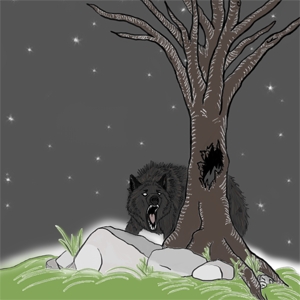 He awoke to rough shaking.
He awoke to rough shaking.
The clock told him it was just after three in the morning.
“I heard something,” said Violet.
“Huh,” he pinched the sleep from his eyes, “Can you be more specific? Was it a murderer something? A burglar something? A Billy something?”
A month earlier, they’d discovered that their son had taken up the habit of climbing from under his covers and spreading his various collections of Lego, cars, and Batmen, across his floor. Finally sick of his denials, they’d un-boxed their baby monitor, and set it in his room so they might keep tabs on his behaviour.
“I think he’s out of bed and tossing his stuff around. It’s quiet now, but I’d swear that he tipped over his big bucket of trucks a minute ago.”
As they lay staring at the bar of red lights which would flare at any noisy provocation, he began to doze.
He started to a slamming sound, familiar to any afternoon on which Billy was too excited to carefully close his toy box.
Carlos’ brought his feet to the floor, and the annoyance of being turned out of his own bed sped his footsteps down the hall.
Grasping the door handle, he started his lecture.
“Buddy, what do you think -”, even through the night-murk, it was obvious Billy was sleeping peacefully – and yet Carlos still found his foot impaled on the rear-fin of a rogue Batmobile.
“Dad?” asked Billy, his slumber having been interrupted by the truncated chiding.
“Uh, nothing pal,” replied Carlos. “Lie back down, we’ll clean this up tomorrow.”
Violet was asleep by the time he’d finished his detour for a stolen mouthful of milk from the jug, and he thought it best to wait till morning to discuss the possibility of their son’s sleep walking.
Despite the comfort of his sheets, and the warmth of his wife’s nearby body, something sat wrong in his stomach, and it was a long two-hours, spent with his ears strained for any disturbance, before he nodded off.
* * *
Three uneventful days later, with Violet once again on her side, snoring, Carlos was watching Letterman and preparing for sleep.
“Goob, goob, goob,” said the monitor.
In a single, silent, motion, he stood from his bed and reached for a t-shirt. With a steady wrist, he noiselessly exited.
“Buh,” replied the monitor.
Under the photographic eyes of distant cousins and cherished aunts, a moment’s creeping brought him to Billy’s door, where he set his ear against the thick layer of stickers they’d allowed the boy to apply.
There was a pause, then a thud, as if something had been thrown against the nearest wall.
With a twist and a push, the dim glow of the hall’s nightlight followed him inside. The area was once again in a state of disarray, but he didn’t bother to wake Billy.
He’d finally recognized a familiar pattern in the chaos.
The next day he re-packaged the monitor. He also made a point of adjusting his cellphone’s alarm, so that he might rise early to tidy, before Violet woke.
* * *
Three days prior to their departure date, Carlos’ eyes were black with a lack of sleep. Using packing as an excuse, he’d transitioned the equally unrested Billy into the living room, setting him up on the couch for the final phase of the move. The child slept better, and it gave his father an opportunity to sort and discard action figures, as necessary.
A new concern had made itself known on the previous morning, when Billy, carrying a single, gnawed, plastic-arm, had approached Carlos.
“I can’t find the rest of this guy, and look, I think something’s been chewing on him!”
“Huh,” he’d replied, noting the watchful eye of his wife. “Must be a rodent.”
“That’s disgusting,” Violet had stated.
“Can I have it as a pet?” Billy had asked.
“I’ll get some mousetraps,” was Carlos’ reply, He’d pocketed the damaged limb, then added, “good thing we’re moving.”
The issue was that, as the hours ticked down, it wasn’t just the Bat-appendage – nearly every plastic and pliable surface within the boy’s room began to display the nicks and dents of toothy wear.
Once the job was complete, and the last of the Transformers posters, and Star Wars colouring books were sealed, Carlos used buying steaks for supper as an alibi, then deposited every box that had Billy written in thick black marker across its top at a nearby Salvation Army depot.
* * *
Twenty four hours before their scheduled takeoff time, Carlos slammed his son’s former-bedroom’s entrance, and picked a fight with Violet. It wasn’t hard – they’d both been on edge over the impending relocation, and his lack of sleep had done little to brighten his mood.
“What is your problem?” she shouted.
“You know,” he replied. He knew she didn’t.
“You’re being ridiculous. I’m taking Billy to Mom’s for the night, but you’re staying here.” The whole family had intended on embarking from Violet’s Mother’s, but he was happy to cut open the tape on a few boxes to locate bedding if it meant she was leaving immediately.
She did.
When he heard the screen door bang to a close, he let out a deep breath.
Entering the kitchen, he began to fill a bucket with soapy water. As he closed the tap, he paused, thinking he might have heard a distant crying – he was relieved to be wrong. Retrieving a rag, he carried his load to the room he’d been defending.
Carlos could live with Violet’s rage – he knew it was temporary, and he’d much rather take the blame for griping than divulge to his wife that he suspected the spirit of the girl she’d lost during birthing, fourteen months earlier, was slowly aging inside the house.
As he scrubbed at the looping and aimless marker scrawl that now adorned the walls, he began to weep for the child he felt he must abandon for the sanity of his remaining family.
Flash Pulp is presented by http://skinner.fm, and is released under the Canadian Creative Commons Attribution-Noncommercial 2.5 License.
Text and audio commentaries can be sent to skinner@skinner.fm, or the voicemail line at (206) 338-2792 – but be aware that it may appear in the FlashCast.
– and thanks to you, for reading. If you enjoyed the story, tell your friends.
Tonight we present Deliver Me From Evil
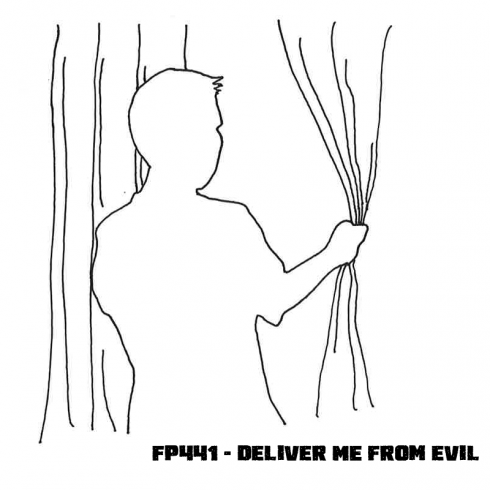
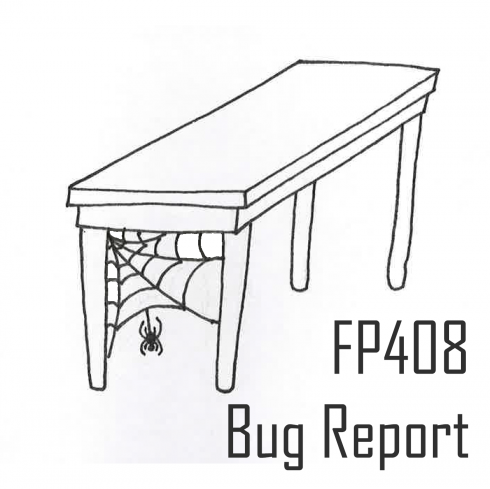
 The Melancholy, as it came to be called, was thus well known to the Corosians – although, as the coverage spread into rumours that cases of infection had carried beyond the perimeter of the quarantine, the isle’s inhabitants took some comfort, in the thankful moments of their kitchen table prayers, that there was an ocean between their families and the troubles.
The Melancholy, as it came to be called, was thus well known to the Corosians – although, as the coverage spread into rumours that cases of infection had carried beyond the perimeter of the quarantine, the isle’s inhabitants took some comfort, in the thankful moments of their kitchen table prayers, that there was an ocean between their families and the troubles.
 “I’m of the old school,” Mrs. Hemming, her current prospective-customer, was saying through a thin-lipped mouth, “but it strikes me that a girl your age shouldn’t be out running around by herself.”
“I’m of the old school,” Mrs. Hemming, her current prospective-customer, was saying through a thin-lipped mouth, “but it strikes me that a girl your age shouldn’t be out running around by herself.”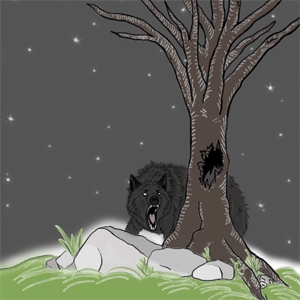 To the left of the bench-row of plastic chairs he was watching a couple of twenty-somethings fretting their way through paperwork while their infant daughter wailed from inside her bright pink car seat. Her mother was rifling a thick purse as the father used his non-writing hand to ineffectually rock the bassinet by its carrying arm.
To the left of the bench-row of plastic chairs he was watching a couple of twenty-somethings fretting their way through paperwork while their infant daughter wailed from inside her bright pink car seat. Her mother was rifling a thick purse as the father used his non-writing hand to ineffectually rock the bassinet by its carrying arm. Now, I should clarify, it wasn’t as if I was strolling about like a grandmother on her way back from Sunday service. The madness of Hitchcock’s Disease had fully gripped my mind by then, and I managed forward momentum only through slow progress and carefully affected casualness.
Now, I should clarify, it wasn’t as if I was strolling about like a grandmother on her way back from Sunday service. The madness of Hitchcock’s Disease had fully gripped my mind by then, and I managed forward momentum only through slow progress and carefully affected casualness.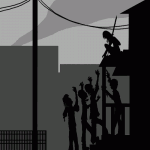
 Nathaniel Minor had been born with a curious inability to identify danger.
Nathaniel Minor had been born with a curious inability to identify danger. He awoke to rough shaking.
He awoke to rough shaking.